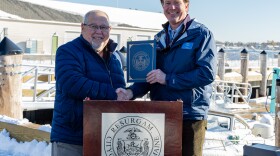-
As the ground freezes, it becomes harder for underground aquafers to refill with rain or snow runoff.
-
As the Gulf of Maine warms due to climate change, invasive sea squirts have become a major issue for the aquaculture industry, weighing down equipment and colonizing underwater surfaces.
-
The collaboration will focus on protecting Portland's working waterfront and coastal areas from sea level rise, as well as meeting sustainability goals like electrification.
-
Informational signs containing information on climate change, ecology and Native American history have been removed from Maine's Acadia National Park, one of the country's most popular national parks. Many national parks are seeing similar actions.
-
Over 250 wildfires burned across Maine in August, more than twice the average number for the month. But climate change could escalate the fire threat, and some communities are preparing for a future clouded by flames, smoke and ash.
-
While some parts of Maine saw rain over the weekend, drought conditions are still in effect. They're affecting all types of crops — from apples to potatoes to wild blueberries. But the biggest challenge may be for farmers who grow hay to feed their livestock.
-
Researchers at Bigelow Laboratory for Ocean Sciences are part of an international team studying how zooplankton may contribute to carbon storage.
-
Local families and visitors also sought relief at a public splash pad in Deering Oaks Park.
-
Since President Trump took office in January, environmental information, including climate-related data has been scrubbed from some federal agency websites. While scientists and policymakers are concerned about disappearing data, it also disrupts teachers' lesson planning.
-
Some of Maine's youngest climate activists rallied at the legislature and exchanged ideas at a statewide summit.
Bangor Studio/Membership Department
63 Texas Ave.
Bangor, ME 04401
Lewiston Studio
1450 Lisbon St.
Lewiston, ME 04240
Portland Studio
323 Marginal Way
Portland, ME 04101
Registered 501(c)(3) EIN: 22-3171529
© 2026 Maine Public
63 Texas Ave.
Bangor, ME 04401
Lewiston Studio
1450 Lisbon St.
Lewiston, ME 04240
Portland Studio
323 Marginal Way
Portland, ME 04101
Registered 501(c)(3) EIN: 22-3171529
© 2026 Maine Public

Play Live Radio
Next Up:
0:00
0:00
Available On Air Stations
Scroll down to see all available streams.










